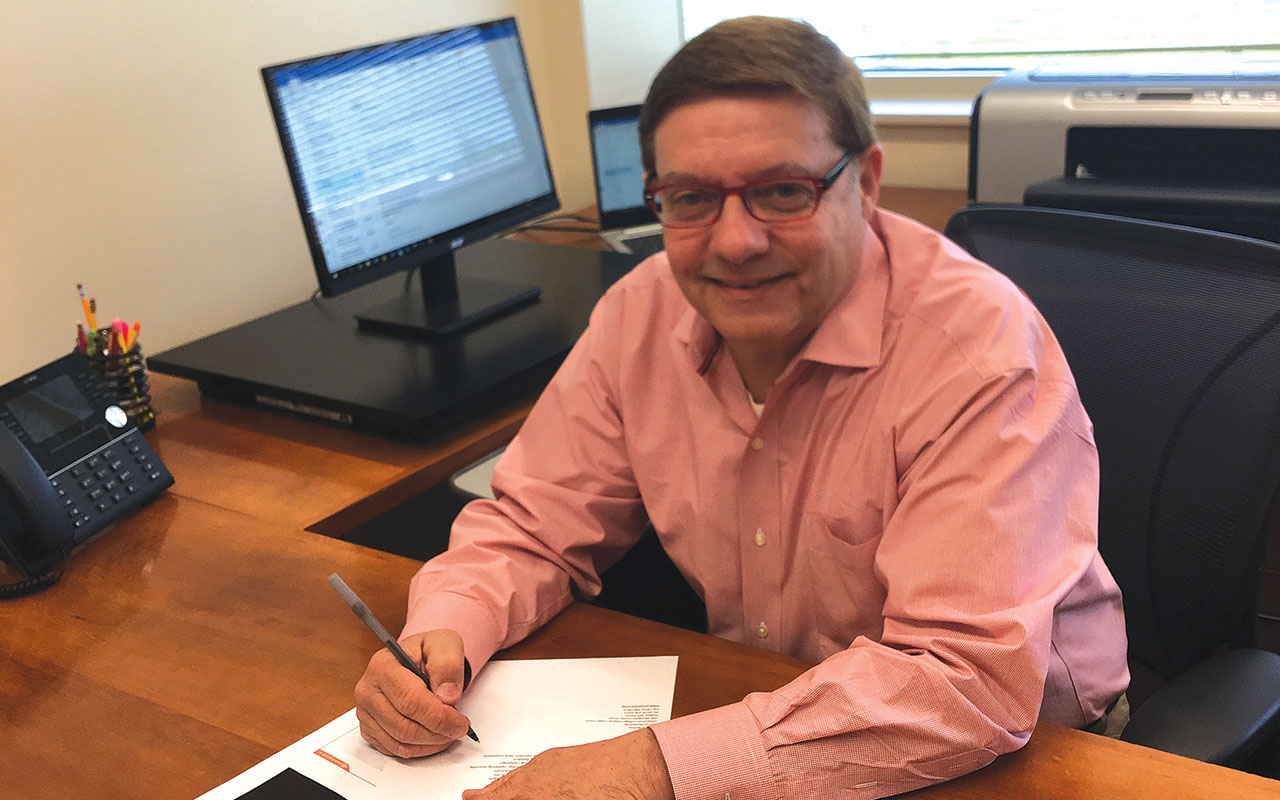Adding It Up
 It’s no secret that too many Americans make poor borrowing decisions, fail to save for retirement, even lack basic budgeting skills. That financial-literacy deficit begins early, say local bank and credit-union officials, which is why area institutions offer programs and classes to help people — both teenagers and adults — forge better strategies for making their money work for them, not drag them down.
It’s no secret that too many Americans make poor borrowing decisions, fail to save for retirement, even lack basic budgeting skills. That financial-literacy deficit begins early, say local bank and credit-union officials, which is why area institutions offer programs and classes to help people — both teenagers and adults — forge better strategies for making their money work for them, not drag them down.
So much, Lena Buteau says, comes down to tiny decisions that add up.
Take that morning coffee. If someone spends $2.69 at Dunkin’ Donuts every morning, that comes out to well over $900 a year. Spend $7 or $8 on lunch five times a week instead of packing a lunch at home, and you’re looking at around $2,000 a year.
“When you think you can’t afford something, look at your daily expenses,” said Buteau, vice president of Retail Administration at Monson Savings Bank, while explaining the importance of MSB’s financial-literacy programs, many of which target students, but which are needed by many adults, too.
For instance, people of all ages often struggle to understand the long-term impact of buying on credit, she noted, using the example of someone who buys a $650 laptop at Best Buy but takes a $150-off deal to put it on a store credit card at 25% interest, then pays only the minimum every month. At that rate, that laptop would be paid off in seven years — eventually costing more than double its original price tag.
“When you explain this, the kids are shocked at the numbers,” she said. “It really touches home.”
Because so many habits and philosophies are forged early, Buteau said, “we go in and teach students about saving, lending, credit scams, how to keep your money safe, and much more.”
And it’s not just schools, she added. “We want to go to church groups, Boy and Girl Scout troops, anybody that will give us an hour of time for a financial-literacy class.”
“No disrespect to the schools, but they’re not preparing kids for real life — how your credit score affects your insurance and buying a car, how to handle a checkbook.”
Michael Ostrowski, president and CEO of Arrha Credit Union, said his institution has an internal focus on financial literacy.
“No disrespect to the schools, but they’re not preparing kids for real life — how your credit score affects your insurance and buying a car, how to handle a checkbook. People don’t go into banks anymore; they do stuff online, and you can get ripped off if you don’t know what you’re doing.”
For that reason, Arrha has worked with high schools in the past on financial-literacy programs and is currently planning another program for local students.
“When we were kids, we had home-ec class, and they used to explain how to do a checkbook. They don’t do that anymore, and I don’t know why,” Ostrowski said, before offering one possible reason. “With all the regulations schools are under, for MCAS and other things, they’ve bailed on programs like this, but they’re absolutely critical for kids’ development and future life.”
Jon Reske, vice president of Marketing at UMassFive College Federal Credit Union, pointed out that financial literacy, and education in general, has long been part of the credit-union culture.
“Why? Because, unfortunately, your parents and my parents probably never taught us anything about personal finance, especially if things weren’t going well in the household,” he told BusinessWest. We take the opposite approach — we say your kid should be involved in understanding how the budget works in your house.
“We also do workshops on a regular basis — everything from homebuying 101 to how to create a budget to understanding credit,” he added, noting that the latter is especially critical, as the average American, between the ages of 21 and 65, will borrow about $1.5 million, and bad decisions can compound quickly and have a long-term impact. “You can be the greatest budgeter in the world and be smart about your pennies, but if you make bad borrowing decisions, you can be overwhelmed by debt.”
Monson Savings also conducts workshops for adults, such as first-time homebuyers, and offers a Credit Builders loan program, which is an effective way to, as the name suggests, build credit without going into unmanageable debt. The customer borrows a certain amount from the bank, which is deposited into a savings account and cannot be accessed until the loan is repaid. Not only does the borrower build positive credit through on-time payments, but at the end, the balance, plus interest, is available for a down payment on a car or home, a cushion for emergencies — anything, really.
In short, area institutions understand the deficits that exist when it comes to financial literacy and how that impacts the decision-making process — and how bad decisions can turn into years of heartache. And they’re doing something about it.
A Matter of Confidence
A new national survey by Junior Achievement USA and Citizens Bank shows that more than 30% of teens do not believe they will be financially independent of their parents by the age of 30. Sixty percent believe they will own a home by that age, 44% believe they will begin saving for retirement, and 43% think they will have paid off their student loans.
“With a strong economy, you would think teens would be more optimistic. It just demonstrates the importance of working with young people to help them better understand financial concepts and gain confidence in their ability to manage their financial futures.”
“These survey findings show a disconcerting lack of confidence among teens when it comes to achieving financial goals,” said Jack Kosakowski, president and CEO of Junior Achievement USA. “With a strong economy, you would think teens would be more optimistic. It just demonstrates the importance of working with young people to help them better understand financial concepts and gain confidence in their ability to manage their financial futures.”
Financial literacy has long been a cornerstone of Junior Achievement, but there’s no shortage of educational programs available at credit unions and banks.
“Money is very emotional. It’s one of the hardest things to talk about, even with your spouse,” Reske said. “And it’s hard to be objective. That’s why it’s nice when people come to our workshops and say, ‘I’m not emotional now; I’m looking at the objective side of it. I wish I’d taken this before getting that loan.’”
While money issues can seem overwhelming at times, he added, financial-literacy tools are much more accessible than they were 10 years ago if people know where to look. He also outlined a number of concepts people attending UMassFive’s workshops might learn. For example:
• If you’re able to pay bills weekly, as they arrive, do it. It reduces the risk of missing a deadline and winding up with a late fee, which is easy to do when you pay the whole pile of bills once a month.
• Start building an emergency fund. According to a U.S. News & World Report study, two-thirds of Americans would struggle — and often do — to come up with $1,000 for an emergency, like an urgent car repair or medical procedure.
“So what happens? You put it on a credit card, and now you’re paying 21% interest, and soon $1,000 turns into $1,200,” Reske noted. “And an emergency fund can keep you from missing a rent payment or not getting something fixed on your car, which could lead to a bigger repair in three to six months.”
• Check out your credit report on an annual basis, if only to make sure everything is correct. “If the activity on your credit report is inaccurate, you’re getting an inaccurate score, and most rates you get are based on your score.”
• Put every credit card on a minimum automatic payment so you don’t miss any payments — and then pay more principal when the bill arrives in the mail. Also, it’s not a bad idea to dedicate one credit card to online purchases only, to more easily identify instances of identity theft.
• Finally, it’s never too early to start saving for retirement. According to Forbes, 33% of adults have zero saved for retirement.
“Social Security will pay a portion of your expenses, but not all,” Reske said. “Time is more valuable than money because of compounding interest. If you start planning at 50 or 55, you just don’t have enough time; you’ve wasted 20 years. And if you have a 401(k) at work with an employer match and you’re not on it, you’re being foolish.”
Budget Battles
UMassFive also conducts a workshop for high-school seniors in which they choose a career, get a salary, and then go from station to station filling out a budget in different categories, from housing, transportation, and food to luxury items and student loans — and trying to stay within that budget.
“Kids say, ‘I never knew how expensive things are,’” Reske said. “People wonder why a 40-year-old can’t come up with $1,000 for an emergency; it’s because they weren’t taught that the key is to get in front of problems as early as possible” with smart budgeting followed by spending discipline.
Monson Savings runs a similar program in local schools. “One thing I build in there is student debt. If you want to spend $30,000 a year on college and go for a $30,000-per-year job, you’re not going to be able to pay that back,” Buteau said, stressing the importance of making smart decisions about college — if college is even the best option.
In fact, she said, many kids today are so focused on college — because it’s what their schools push — that they may not be aware of careers in the trades that offer robust salaries and no long-term debt.
One thing is for sure: whether in high school, college, early adulthood, or beyond, there’s no bad time to learn more effective strategies for handling money, budgets, and credit — in other words, to become more literate.
“If you’re sick, you go to the doctor,” Buteau said. “If your car is broken down, you go to a mechanic. If your pipes are broken, you call a plumber. But if you have trouble budgeting or financing, no one thinks to go to the bank for advice or a class. And it’s free.”
And when it comes to finances, there’s nothing wrong with free.
Joseph Bednar can be reached at [email protected]







